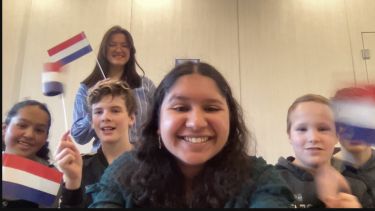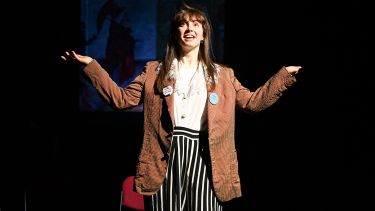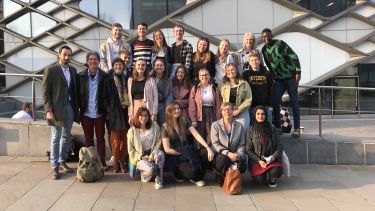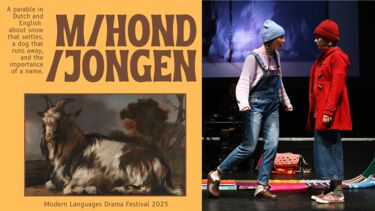Dutch Studies - 2025 entry
Spoken across the Netherlands, Flanders, Suriname and parts of the Caribbean, Dutch is a popular language with students and UK employers.

With around eighty students on our programmes, we are the largest Dutch section in the UK in terms of student numbers. This popularity is a testament to the lively, ambitious atmosphere; there is always something going on and you’ll quickly feel included and at home with us.
Module information
Core modules:
| Dutch For Beginners | 20 credits | For this intensive beginners language course you will work for 4 hours a week in small groups. Dutch is an accessible Germanic language spoken by 24 million people. We will work on all aspects of language learning and and you will read your first short book in Dutch before Christmas. With a bit of effort and dedication you will reach a generous CEF level A2. Our students tend to really enjoy this course. |
| Resist! The Art of Protest in Berlin & Amsterdam | 20 credits | Amsterdam and Berlin are two capitals at the forefront of protest and alternative lifestyles from the early 20th century right up to the present. Where did their radical traditions spring from? What do these protests say about how the cities and nations see themselves? How does creative resistance fuel gentrification and urban tourism? This module explores the culture of resistance and protest from the first women’s march for the vote and posters and activism against war and fascism, to the creative resistance of the Amsterdam provo movement and more recently Pride Canal Parade and Black Lives Matter/Kick out Zwarte Piet. |
| Languages and Cultures Essential Skills | 0 credits | This module is skills-based and will cover such areas as: Transition to Studying at University The best ways to learn languages Library (research skills, critical thinking, Referencing and plagiarism) Personal Skills audit What do we mean by Studying Cultures Careers (support available) Module choice and planning for higher levels It is designed to help you find your way around the learning resources available, to enhance your soft skills, improve your employability, to make you aware of the various types of support on offer. |
In your second year, whilst continuing to develop your spoken and listening language skills, you will also deepen your understanding of political, social, and cultural contexts. You will also have the opportunity to engage with more specialised thematic modules which explore the relationship between language, culture, and identity. Modules could include:
- Arts of Persuasion
- Why Read?
- Translation
- That is not my (Hi)story
- Language and the Self
- Languages of Gender and Sexuality
- Revolutions and Revolutionary Trends
You'll spend your third year abroad, immersed in Dutch language and culture.
Your final year on the BA Modern Languages and Cultures is about deepening the language and cultural expertise you have developed through your previous study and year abroad. You will then apply this learning to contemporary global issues and a range of career-relevant scenarios. Modules could include:
- A Languages and Cultures dissertation or translation
- Social Approaches to Multilingualism
- Tales of Cities
- Comparative Critique of Consumer Culture
- Migration and its Representations
- Global Careers in Languages
- Music and Performance
The content of our courses is reviewed annually to make sure it is up-to-date and relevant. Individual modules are occasionally updated or withdrawn. This is in response to discoveries through our world-leading research, funding changes, professional accreditation requirements, student or employer feedback, outcomes of reviews, and variations in staff or student numbers. In the event of any change we'll consult and inform students in good time and take reasonable steps to minimise disruption.
Information last updated:

International undergraduate scholarships
We are offering scholarships of £2,500 for each year (subject to a 60% average) of your undergraduate degree. The maximum value is £10,000 for four-year programmes.









